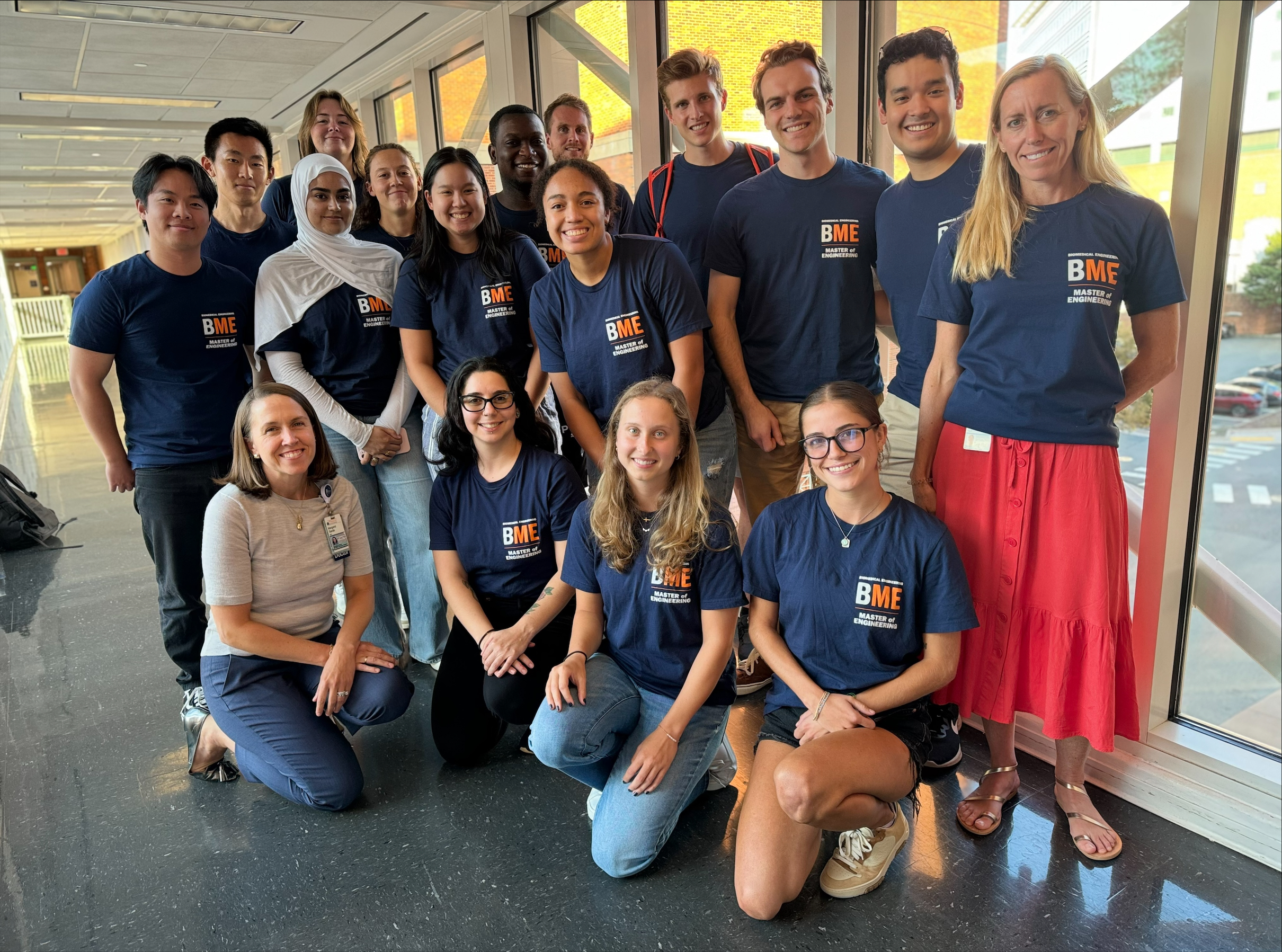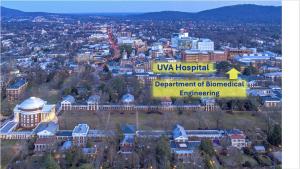M.E. in Biomedical Engineering
For biomedical engineers who have just finished their undergraduate degrees or who have been in the field for a few years and want to apply their skills to developing innovative medical technologies.
ME Program Contacts

Noah Perry
Noah Perry focuses on leading clinically driven engineering projects that prepare graduate students to address complex healthcare challenges through innovative design and interdisciplinary collaboration.
Apply Now
Earn your Master of Engineering degree in biomedical engineering from the University of Virginia! Applications are open for Fall 2026 enrollment for in-person master’s programs.
UVAccelerate
Current UVA undergraduate and Sweet Briar College engineering science students can apply to our ME Program in BME in the third year of their undergraduate studies. This program requires 32 total credits of coursework and design work, and with the right planning, you may be able to get a head start on taking graduate-level courses while finishing your bachelor’s degree. Save time and money by accelerating your time to completion of a master’s degree!
The purpose of UVA’s Master of Engineering (ME) Program in Biomedical Engineering is to provide students with the skills, knowledge, and habits that will prepare them for a professional career in biomedical engineering or other problem-solving occupations, or for further graduate study. The ME Program in BME features a two-semester curriculum of carefully sequenced courses that give students the skills needed to develop and commercialize biomedical innovations. Students collaborate in teams to do hands-on engineering design projects and work closely with clinicians and other care providers to develop solutions to real medical problems.
You will experience all these opportunities in the context of instruction and mentorship from BME and clinical faculty at one of the most translational biomedical engineering departments in the nation that is physically located in the UVA Medical Center.
Students graduating with their ME Degree in BME will have:
- an awareness of their unique skills and expertise (i.e., their "superpowers") and how to market them,
- a job, or the next educational step, lined up and knowledge about what it will take to be successful in that job, or next educational step, before it starts,
- the habits of a successful professional,
- the ability to manage and collaborate with a diverse team to move a project from start to completion,
- an understanding of the engineering design process in the context of biomedical industries, and
- proficiency in identifying problems and solving problems.
Applying is Free!
The School of Engineering and Applied Science is excited to announce that the GRE and standard application fee will be waived for 2026 admission to all our graduate programs. At UVA Engineering, our admissions process is designed to welcome a diverse, talented, ambitious and well-rounded pool of prospective graduate students. Admissions committees in each of our graduate programs review every applicant's entire package, looking for academic capabilities, research experiences, leadership and passion for his or her chosen field. Applicants are not required to submit a form or enter a code to receive the fee waiver, as it will be automatically applied to the application.
Unmatched Clinical Exposure
The UVA Department of Biomedical Engineering is located within a large regional medical center with top-ranked programs in a wide range of clinical specialties. You will observe physicians, nurses, and technical staff in the operating room, as well as at the bedside, gaining in-depth understanding of the way biomedical technology is embedded in clinical practice as well as the clinical, economic, and social factors that will shape the future of biomedical industries. Each student design team works closely throughout the 9-month duration of the program with their "Clinical Champion", who serves as mentor and facilitator for clinical immersion experiences.
Emphasis on Biomedical Innovation
Moving technology into the marketplace has long been a department priority. Many of our BME faculty, students, and graduates are entrepreneurial and have founded and lead companies. The BME Department's Wallace H. Coulter Translational Research Center has an impressive record of bringing innovations discovered in BME at UVA into the marketplace. As a student in the ME Program, you’ll acquire the skills necessary for -- and participate in -- developing and commercializing biomedical innovations that solve clinical problems, bring hope to patients, and transform lives.
Design Informed by Clinical Data and Empathy
Students build and strengthen skills in programming, machine learning/AI, and data analytics as applied to clinical data and electronic medical records to guide biomedical product development. Additionally, students learn how to integrate empathy as a core design principal into their engineered solutions by conducting stakeholder interviews, researching and discussing case studies, and through regular interactions with patients and medical providers in the clinical setting.

Job Titles and Employeers of Recent ME Program Graduates
Data Scientist at Rancho BioSciences
Process Engineer at Senseonics
RNAi Discovery Scientist at AgroSpheres
Medical School Student at Carle Illinois College of Medicine)
Associate Human Factors Engineer at ZOLL
Medical Corporation Senior Design Engineer at Luminoah
Software Engineer at Abbott R&D Engineer at Abbott
Structural Heart Project Engineer at PAVmed Inc.
Quality Engineer, Post Market Surveillance, Endo at Boston Scientific
Data Scientist at Springbok Analytics
Product Development Engineer at Onkos Surgical
Software Engineer at Capital One
Associate Clinical Account Specialist at Biosense Webster
Equipment Engineer 1 at Illumina
Sr. Associate Product Manager at NuVasive
Quality Assurance Engineer at MicroAire
Medical Device Patent Examiner at US Patent and Trademark Office
Quality Engineer at Abbott
Senior Engineer at Biocore LLC
Product Development Engineer at Cerillo
Biomedical Engineering Patent Examiner
Electrophysiology Mapping Specialist at Boston Scientific
Analyst at Treya Partners
Senior Product Analysis at Springbok Analytics
Data Engineer at Springbok Analytics
Product Engineer at Tailored Solutions
Validation Engineer at Cook Polymer Technology
Data Scientist at Asterion
AI Research Associate at Agrospheres
Quality Engineer at Teleflex
IGT Subject Matter Expert at Phillips
Biomedical Eng & CTO of Epiderma
Research and Development Engineer at ivWatch Clinical
IT Developer at Medtronics
Computer Vision Engineer at Terra Pixel Corp
Clinical Specialist - Spine Enabling Technologies at Stryker
Quality Control Tech at Medcura, Inc.
Bioengineer at 3D Orthobiologic Solutions (3DOS)

Location Matters
The BME Department is part of the UVA Medical Center and is physically connected to the UVA Hospital. This proximity provides a unique and authentic training experience for biomedical engineering students, who have daily interactions with patients, doctors, and other care providers as they develop and deploy their skills to solve problems in healthcare and medicine in the No. 1 hospital in Virginia and one of the top-40 ranked hospitals nationally.
The information contained on this website is for informational purposes only. The Undergraduate Record and Graduate Record represent the official repository for academic program requirements. These publications may be found here.